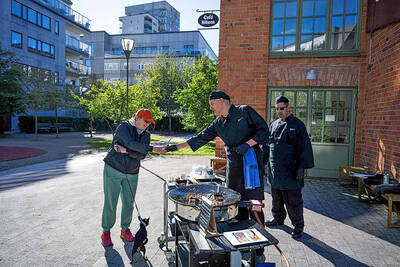Cambodia's ethnic Vietnamese are scurrying back to their native land or bunkering down, fearing that a campaign of racial slurs in the lead-up to this Sunday's elections could turn violent.
Throughout the campaign the royalist FUNCINPEC party and to a lesser extent the opposition Sam Rainsy Party (SRP) have played on the historical racial hatred of their neighbors.
Consistent references to yuon -- a derogatory term for Vietnamese -- along with promises to set up a migration ministry to monitor the Vietnamese and home-spun superstition have sent a powerful message the government has described as "a shame."
The distrust of all things Vietnamese dates back centuries to claims the southern area of Vietnam belonged to a greater kingdom of Cambodia subsequently lost through land grabs and borders drafted by French colonialists.
In Cambodia, Vietnamese are present in all strata of society, from those living in atrocious slums to senior members of the business community and the government.
A 50-year-old Vietnamese woman said her compatriots had recently taken note of shooting stars in the night sky and interpreted them as portents for war.
"I also live in fear. When I heard Ranariddh targeting yuon during his election campaigning, I decided to stay home," she said, referring to FUNCINPEC chief Prince Norodom Ranariddh.
Ranariddh dealt the race card on the June 26 campaign kick-off, announcing that his ministry would tackle the yuon.
One political analyst said FUNCINPEC needed to differentiate itself from the ruling Cambodian People's Party (CPP) and Prime Minister Hun Sen, who is favored to easily win the upcoming polls.
FUNCINPEC is a junior coalition partner to the CPP in the government and its failure to distance itself during last year's local elections was widely blamed for its poor showing at those polls.
Hun Sen, who has had solid links with Hanoi since being installed as a senior minister by Vietnam after it invaded Cambodia in 1979 and ousted the dreaded Khmer Rouge, rarely criticizes his former paymaster.
Renowned Khmer scholar Michael Vickery recently compared the use of the word yuon -- which means barbarian -- with "nigger."
It is a "derogatory designation and those politicians and intellectuals who insist on using it must be denounced as pandering to, even encouraging, ethnic prejudice, hatred and violence," he wrote in the Phnom Penh Post.
The government estimates at least 100,000 Vietnamese live in Cambodia but does not divulge how many of them are illegal, nor how many are now fleeing.
But one long-time observer as well as a diplomat have both estimated around 2,000 have headed for the safety of their homeland, while hundreds more in Vietnam are likely to have cancelled trips to Cambodia.
Violent outbreaks left two Vietnamese dead just after the 1998 elections, while government spokesman Khieu Kanharith told reporters "a lot" were killed before the 1993 poll, but no exact figures were recorded.
"It is a shame for the whole of Cambodia that these leaders have no programs for the development of the country, but only play on extreme issues like racism," he said.
None of the Vietnamese who spoke to reporters wanted to release their names, insisting on a low profile until after the elections. The Vietnamese Association of Cambodia declined to comment.
"Me and my friends are buying up water and food and basically staying at home until all this is over. We can't afford to go back," one Vietnamese man said.
"Vietnamese are frightened -- really scared -- that all this racist nonsense might turn ugly," he said.
He added some had sold their homes before leaving for Vietnam and may not return, while another Vietnamese man said: "If FUNCINPEC wins, all Vietnamese will leave Cambodia."
And the capital's more notorious karaoke bars are reporting an absence of Vietnamese sex workers.
"My friends tell me that Vietnamese girls are heading home and will come back to Cambodia only if Hun Sen wins," said a 28-year-old Vietnamese woman living in an area where karaoke bars are plentiful. "Some won't come back."
Another Vietnamese man said each day he listened to a radio station owned by Ranariddh and was angered by the prince's anti-Vietnamese rhetoric.
He wanted to pay the US$10 fare to join his friends on motorbikes and leave the country.
"But I don't have enough money to pay for the trip," he said.

READINESS: According to a survey of 2,000 people, 86 percent of Swedes believe the country is worth defending in the event of a military attack Swedes are stocking up on food items in case of war, as more conflict in Europe no longer feels like a distant possibility, and authorities encourage measures to boost readiness. At a civil preparedness fair in southwest Stockholm, 71-year-old Sirkka Petrykowska said that she is taking the prospect of hostilities seriously and preparing as much as she can. “I have bought a camping stove. I have taken a course on preservation in an old-fashioned way, where you can preserve vegetables, meat and fruit that lasts for 30 years without a refrigerator,” Petrykowska said. “I’ve set aside blankets for warmth, I

FRUSTRATIONS: One in seven youths in China and Indonesia are unemployed, and many in the region are stuck in low-productivity jobs, the World Bank said Young people across Asia are struggling to find good jobs, with many stuck in low-productivity work that the World Bank said could strain social stability as frustrations fuel a global wave of youth-led protests. The bank highlighted a persistent gap between younger and more experienced workers across several Asian economies in a regional economic update released yesterday, noting that one in seven young people in China and Indonesia are unemployed. The share of people now vulnerable to falling into poverty is now larger than the middle class in most countries, it said. “The employment rate is generally high, but the young struggle to

ENERGY SHIFT: A report by Ember suggests it is possible for the world to wean off polluting sources of power, such as coal and gas, even as demand for electricity surges Worldwide solar and wind power generation has outpaced electricity demand this year, and for the first time on record, renewable energies combined generated more power than coal, a new analysis said. Global solar generation grew by a record 31 percent in the first half of the year, while wind generation grew 7.7 percent, according to the report by the energy think tank Ember, which was released after midnight yesterday. Solar and wind generation combined grew by more than 400 terawatt hours, which was more than the increase in overall global demand during the same period, it said. The findings suggest it is

IN THE AIR: With no compromise on the budget in sight, more air traffic controllers are calling in sick, which has led to an estimated 13,000 flight delays, the FAA said Concerns over flight delays and missed paychecks due to the US government shutdown escalated on Wednesday, as senators rejected yet another bid to end the standoff. Democrats voted for a sixth time to block a Republican stopgap funding measure to reopen government departments, keeping much of the federal workforce home or working without pay. With the shutdown in its eighth day, lines at airports were expected to grow amid increased absenteeism among security and safety staff at some of the country’s busiest hubs. Air traffic controllers — seen as “essential” public servants — are kept at work during government shutdowns, but higher numbers